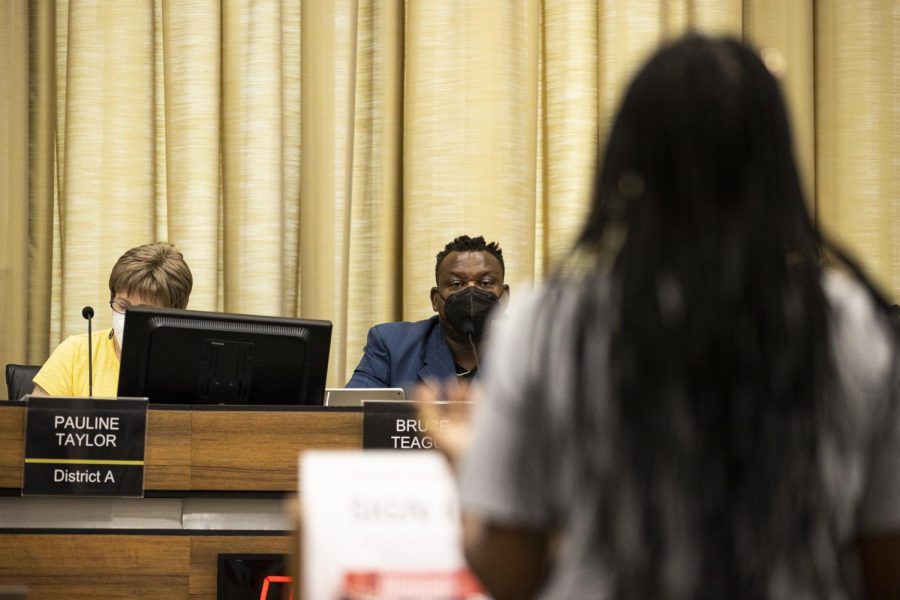Iowa City City Council delays motion to remove Truth and Reconciliation Commission chair
The Iowa City City Council delayed a motion to remove Truth and Reconciliation Commission chair Amel Ali for comments made about Johnson County Board of Supervisors Chair Royceann Porter.
Iowa City mayor Bruce Teague listens Truth and Reconciliation Chair Amel Ali during a special meeting of Iowa City City Council for the removal Ali from her position on Thursday, Aug. 4, 2022.
August 4, 2022
Editor’s Note: This article contains language some might find offensive.
The Iowa City City Council delayed during a sometimes contentious meeting Thursday removing Amel Ali from her position as Truth and Reconciliation Commission chair.
The delay will give the council time to consider comments it heard that overwhelmingly favor keeping Ali as the commission leader. The commission was formed to carry out restorative justice through the collection of testimonies and public hearings to fight against racial oppression in Iowa City.
Ali, 27 — who also works as CommUnity Crisis Services and Food Bank’s diversity, equity, and inclusion outreach specialist — has come under fire from Johnson County Supervisors Chair Royceann Porter for using what was perceived to be a derogatory word during a local podcast in June.
Porter, a former Truth and Reconciliation Commission member who is Black, complained to the council and, with members of her local organization, the Black Voices Project, asked for Ali’s removal at a City Council meeting Tuesday night.
The council voted 7-1 at a special session on Thursday to delay a motion to remove Ali. The council will revisit the vote when it meets at an Aug. 16 meeting. Mayor Bruce Teague was the only council member who voted against tabling.
The decision to table the vote came after 30 minutes of public comment Thursday morning — with most public commenters favoring keeping Ali in her current position, citing that removing her would slow down the commission’s progress — and nearly 40 minutes of discussion among council members.
“I know what I said was wrong,” Ali said to the council.
Ali said she texted Porter earlier back in May asking if she wanted to get together to talk, but Porter responded by declining and saying, “I don’t have time for your bulls***.” This was confirmed by a message thread Ali sent to The Daily Iowan.
The council scheduled Thursday’s meeting just two days after Porter told council members that someone anonymously sent her a recording of a podcast in which Ali called Porter and other members of her organization “coony.” The podcast has since been removed from the web.
The term she used has racist origins, being used by white people against Black people. In modern times, the word has been used by Black people to refer to other Black people who favor white people, act like white people, or put down their own race.
Ali said to The Daily Iowan that she used the word with the modern meaning in mind.
On the podcast, Ali also referred to members of the Black Voices Project as “old farts,” criticized the organization for allegedly taking issue with the Iowa Freedom Riders’ form of activism, and criticized the Black Voices Project for being over 75 percent white. A clip of her saying that was played in the council meeting.
“What I said [on the podcast] was in spite and anger and frustration and nobody is going to ever be able to feel or know how I felt in the midst of everything,” Ali said in an interview with The Daily Iowan. “That s*** sucks and I had to try to find a way to keep myself hopeful and keep the fire burning inside of me.”
In response to Ali’s statement that the Black Voices Project is 75 percent white, Orville Townsend, a member of the Black Voices Project, said while the organization started out with primarily Black members, it is welcoming to everybody who wants to join.
After Porter and other members left the council chambers on Tuesday, an argument ensued between Black Voices Project members and members of the Truth and Reconciliation Commission.
During the altercation, Porter yelled expletives at Truth and Reconciliation Commission members.
“My reaction is what they got,” Porter said to The Daily Iowan, “I’m not [saying] that I wasn’t upset and that I did not cuss because I did. I was more hurt than anything to hear somebody say what they said.”



